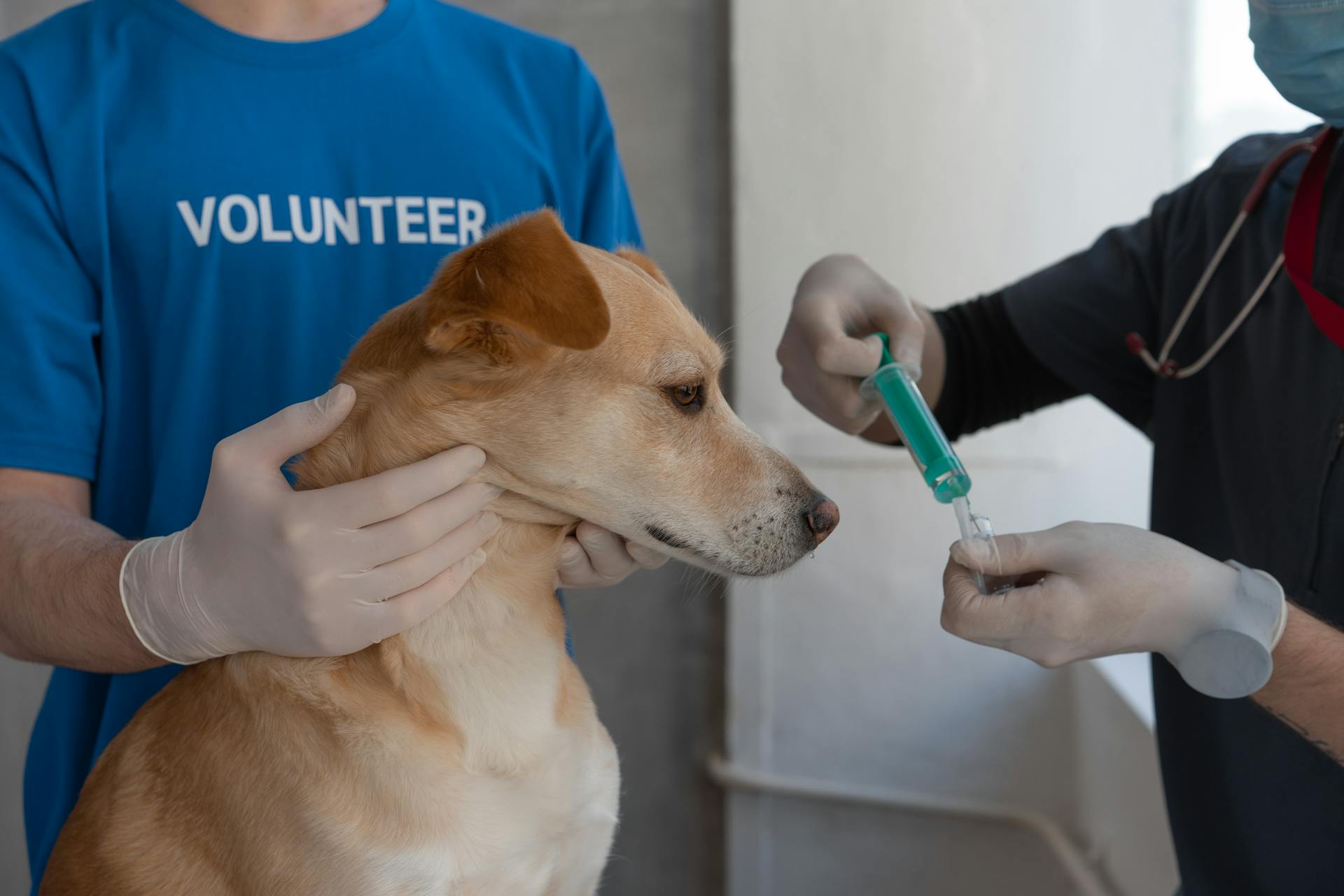
Canine distemper is a highly contagious and often fatal disease that affects dogs of all ages. It's essential to understand the vaccination schedule to protect your furry friend.
The canine distemper vaccine is usually administered in a series of shots, typically starting at 6-8 weeks of age. This initial round of shots is usually followed by a booster shot a few weeks later.
A typical vaccination schedule for canine distemper involves a series of shots given at 6-8 weeks, 10-12 weeks, and 14-16 weeks of age. Booster shots are then given annually or every 3 years, depending on the vaccine type.
Annual boosters are recommended to maintain immunity against canine distemper.
You might like: Canine Age
Vaccination Schedule
The vaccination schedule for your puppy is crucial to protect them from serious diseases like canine distemper. Most veterinarians recommend giving puppy vaccines every two to four weeks until the puppy is at least 16 weeks old.
The typical puppy shot schedule includes core vaccines like DAP (Distemper, Adenovirus/Hepatitis, Parvovirus) and noncore vaccines like Bordetella and Leptospirosis. Your vet may recommend additional vaccines based on your puppy's lifestyle and geographical location.
Here's a breakdown of a typical puppy vaccination timeline:
- 6-8 weeks: DAP and Bordetella vaccines
- 10-12 weeks: DAP and Leptospirosis/Lyme/Canine influenza vaccines
- 14-16 weeks: Final DAP vaccine and Rabies vaccine (may be given earlier if required by law)
- 18-20 weeks: Some dogs in high-risk areas may benefit from receiving the last vaccines around this age
It's essential to consult with your veterinarian to identify the appropriate schedule for puppy vaccines for your specific pet. They will consider factors like your puppy's age, environment, and medical history to create a personalized vaccination plan.
The DHPP vaccine is a core vaccine that protects against distemper, adenovirus, hepatitis, and parvovirus. Most veterinarians recommend giving the final DHPP shot at 16 weeks or later, but new recommendations suggest up to 20 weeks out.
Here's a summary of the DHPP vaccine schedule:
- 1st shot: 6-8 weeks
- 2nd shot: 10-12 weeks
- 3rd shot: 14-16 weeks
- 4th shot: 18-20 weeks
- 5th shot: 1 year
- Booster: every 3 years
It's crucial to follow a consistent vaccination schedule to protect your puppy from serious diseases like canine distemper.
Vaccination Frequency
Puppies need a series of vaccines to be fully vaccinated, with the DHPP vaccine schedule calling for shots at 6-8 weeks, 10-12 weeks, 14-16 weeks, 18-20 weeks, and 1 year.
The final DHPP shot is usually given at 16 weeks or later, but new recommendations suggest up to 20 weeks out.
Dogs need booster vaccinations for Bordetella, Lepto, Lyme, and Giardia annually, while the vaccination schedule for DHPP and rabies is every 3 years.
Here's a breakdown of the booster schedule:
- DHPP vaccine booster: every two weeks for a total of three sets, then every three years
- Lepto, Canine influenza, and Lyme disease vaccine booster: one month after the initial series, then annually
- Bordetella booster: 1 year (or every 6 months where there is a concern)
- Rabies booster: every 1 to 3 years after the initial round, depending on state laws
Core Vaccinations
Core vaccinations are a crucial part of a dog's health routine, and it's essential to understand which vaccines are required for all dogs and puppies.
Core vaccines include the DA2PP, DHPP, or DAPP vaccine, which protects against Canine distemper, adenovirus-2 (hepatitis), parvovirus, and parainfluenza. This vaccine is given as one shot.
The Rabies virus vaccine is also a core vaccine, and it's legally required in most U.S. states for all dogs. This vaccine protects against a highly contagious and fatal viral disease transmitted via a bite from an infected animal.
Here's a summary of the core vaccines for dogs:
In some cases, Leptospirosis may also be considered a core vaccine, especially in areas where the disease is prevalent, such as New York City.
Puppy Vaccinations
Puppy vaccinations are a crucial part of a puppy's first year. Puppies typically receive their first vaccinations at 6-8 weeks old.
Core vaccines include Rabies, DHPPi, and Leptospirosis. The DHPPi vaccine protects against Distemper, Parvovirus, Parainfluenza, and Infectious Hepatitis.
A typical puppy vaccination schedule has puppies receiving vaccinations every 2-4 weeks until they're at least 16 weeks old. Some dogs in high-risk areas may benefit from receiving the last vaccines around 18-20 weeks old.
Here's an example of what a typical puppy shot schedule looks like:
Puppies will need a series of vaccines to be fully vaccinated, which means getting one at 6 to 8 weeks of age and then every 2 to 4 weeks until the pup is 16 weeks old.
After the initial puppy series, dogs will get a booster every one to three years depending on the vaccine manufacturer’s label and your veterinarian’s recommendation.
Additional reading: How Many Kittens Can a Cat Have at One Time?
Distemper Vaccine
The Distemper Vaccine is a crucial part of keeping your furry friend healthy.
Dog vaccinations are split into two general categories: core vaccines and noncore vaccines, and the Distemper vaccine is a core vaccine.
The Distemper vaccine is not 100% effective against disease prevention, but it greatly reduces your dog's risk of contracting Distemper when administered properly.
Most vets prefer giving the final DHPP shot at 16 weeks or later, but new recommendations suggest up to 20 weeks out.
You should always follow your vet's recommendations and complete the proper dose of the Distemper vaccine to ensure maximum protection.
Yes, dogs do have to get the Distemper vaccine annually during their routine wellness exams.
A different take: How to Detox a Dog after Vaccines?
Prevention and Risks
Canine distemper is a viral infection that can cause significant harm to your pet, so it's essential to take prevention seriously. Vaccinations are the best way to prevent distemper in dogs.
The distemper vaccine is not 100% effective, but it greatly reduces the risk of contracting the disease when administered properly. Always follow your vet's recommendations and complete the proper dose of the vaccine.
Reducing exposure to distemper is also crucial in preventing the disease. This can be done by keeping your dog on an annual vaccination schedule.
Take a look at this: What Is Canine Lupus
Distemper Disease Facts
Distemper is a contagious disease caused by a virus that attacks the nervous, respiratory, and gastrointestinal systems of dogs.
Dogs usually become infected through airborne exposure from an infected dog or wild animal.
The disease can also be transmitted by shared bowls, toys, and equipment.
Canine distemper is often fatal, and dogs that survive the disease are usually left with permanent damage to the nervous system.
All dogs are at risk, but puppies under four months of age and unvaccinated dogs are at especially high risk.
A canine Distemper infection often causes significant long-term harm to your pet and can even be fatal.
Distemper in puppies or immune-compromised adult dogs is extremely dangerous, so a vaccine is critical.
If your dog isn’t on an annual vaccination schedule, it’s crucial to keep an eye out for distemper symptoms like loss of appetite, severe diarrhea, and any neurologic or respiratory signs.
Intriguing read: How Often Should I Take My Dog Out?
Prevention Methods
To prevent Canine Distemper, vaccinations are the most effective method.
Vaccinations should be given annually during your pet's routine wellness exams.
Reducing the risk of exposure to Distemper is also crucial in preventing the disease.
Getting your dog vaccinated annually will help protect them from this highly contagious virus.
Missing a Shot Consequences

Missing a scheduled Distemper vaccine is a serious issue that can leave your dog vulnerable to the disease.
Your dog's risk of contracting Distemper is greatly reduced when administered properly, so it's essential to follow your vet's recommendations and complete the proper dose of the vaccine.
Missing a vaccine can lead to severe health issues, including gastrointestinal distress like vomiting and bloody diarrhea, as well as breathing and neurological symptoms.
Distemper in puppies or immune-compromised adult dogs is extremely dangerous, so it's crucial to get your dog vaccinated as soon as possible if they've missed a shot.
We recommend getting the Distemper vaccine annually during your pet's routine wellness exams to prevent these risks.
Worth a look: How Often Dog Grooming
General Information
Dogs need to get the Distemper vaccine annually during their routine wellness exams. This is a crucial part of their health care.
Getting the Distemper vaccine every year is a must for your pet's health and well-being.
Side Effects and Effectiveness
Side effects of the canine distemper vaccine are typically rare, but it's essential to know what to watch for. Mild vaccine reactions can include temporary soreness at the injection site, mild lethargy, inappetence, and mild fever, which should last less than 24 hours.
If your pet experiences symptoms more severe or lasting longer than expected, contact your veterinarian immediately. In rare cases, vaccines can cause life-threatening anaphylactic reactions, so be aware of signs such as vomiting, hives, facial swelling, trouble breathing, and severe weakness or collapse.
Here are some potential signs of a mild vaccine reaction and life-threatening anaphylactic reactions:
- Temporary soreness at the injection site
- Mild lethargy
- Inappetence
- Mild fever
- Vomiting
- Hives
- Facial swelling, particularly around the eyes or muzzle
- Trouble breathing
- Severe weakness or collapse
Side Effects
Side effects of vaccinations can be a concern for many pet owners.
Most vaccine reactions are mild and temporary, lasting less than 24 hours.
Potential signs of a mild vaccine reaction include temporary soreness at the injection site, mild lethargy, inappetence, and mild fever.
It's essential to provide a comfortable and quiet space for your pup to rest after their vaccination appointment.
A few extra snuggles can also go a long way in helping your pet feel better.
Severe symptoms, such as vomiting, hives, facial swelling, trouble breathing, and severe weakness or collapse, are rare but require immediate attention from a veterinarian.
Distemper Effectiveness
The Distemper vaccine isn't 100% effective, but it greatly reduces the risk of your dog contracting the disease when administered properly.
Your vet's recommendations are crucial to ensure maximum protection, so be sure to follow their guidance and complete the proper dose of the vaccine.
A Distemper infection can cause significant harm to your pet, including gastrointestinal distress like vomiting and bloody diarrhea, as well as breathing and neurological symptoms.
If your dog isn't on an annual vaccination schedule, it's essential to keep an eye out for distemper symptoms like loss of appetite, severe diarrhea, and any neurologic or respiratory signs.
The Distemper vaccine needs to be administered annually during your pet's routine wellness exams to keep them protected.
Additional reading: Canine Ehrlichiosis Symptoms
Frequently Asked Questions
Do dogs really need the DHPP vaccine every year?
No, adult dogs typically only need a DHPP booster every 3 years after the initial vaccination series. However, the exact vaccination schedule may vary depending on factors such as lifestyle and geographic location.
How long are Bordetella and distemper vaccines good for?
Bordetella vaccine boosters are typically needed every 6-12 months, while distemper vaccines are usually good for 1-3 years, depending on the dog's risk factors. Regular boosters help protect against these contagious diseases.
Sources
- https://www.petmd.com/dog/care/dog-vaccinations-for-every-lifestage
- https://www.smalldoorvet.com/learning-center/wellness/vaccine-schedules-for-dogs-puppies/
- https://www.petmd.com/dog/general-health/dhpp-vaccination-for-dogs
- https://www.pawlicy.com/blog/puppy-vaccine-schedule/
- https://metrovetclinic.com/resources/canine-distemper-vaccine/
Featured Images: pexels.com


